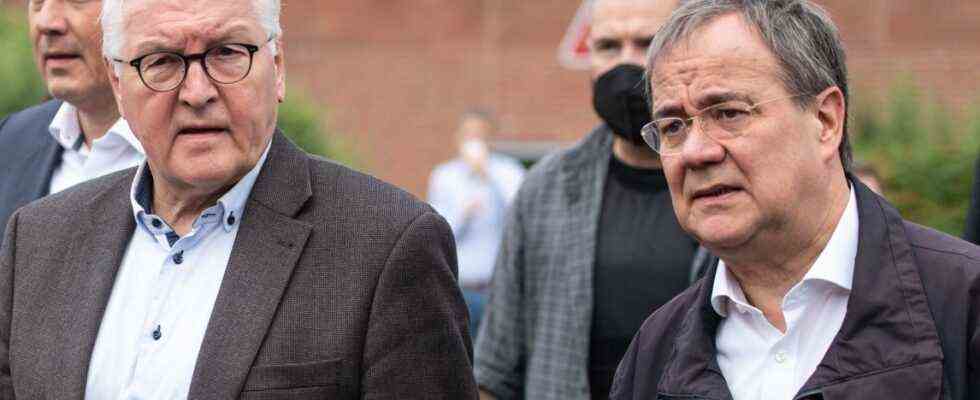Armin Laschet’s press officer has a request to the camera teams and reporters in front of the Erftstadt fire station. She points to the ambulance, which is a few meters behind the barrier tape: “If the ambulance has to go, all microphones have to go quickly.” Helicopters, fire engines and ambulances circling in the air with flashing lights and sirens racing down the streets. Blessem is two kilometers away.
Or what is left of it after heavy rain and huge landslides: a field of rubble with huge craters. On Thursday, unprecedented masses of water washed down the district, tearing away cars, entire houses and half a castle. The situation there is still dramatic on Saturday lunchtime. People are missing, the huge edge threatens to swallow other parts of the village. The water is mercilessly greedy. Six helicopters are in action, rescue workers drive 35 boats between the houses.
Frank-Walter Steinmeier appears in front of the cameras in front of the Erftstadt fire station. The Federal President thanks the rescue and emergency services who “worked to exhaustion and beyond”. If you look into their faces, you can guess “what suffering the people here in this region endure”. In North Rhine-Westphalia, more than 22,000 fire brigades and other aid organizations are involved, many of them volunteers.
Many would have nothing left – except hope: “We mustn’t disappoint them”
Steinmeier is visibly moved. Many people would have lost everything they had built up for themselves. “The greatest loss,” he says now, would be borne by those who have lost family members, friends and acquaintances. “Your fate tears our hearts apart.” Many people in the flood areas had nothing but hope. “We must not disappoint this hope,” says Steinmeier, referring to donation accounts.
Together with the Prime Minister of North Rhine-Westphalia, Armin Laschet (CDU), the Federal President traveled to the Rhein-Erft district about 40 kilometers south of Cologne, which was particularly badly hit by the floods. The two politicians had spoken to rescue workers in the disaster area and had the crisis team inform them. “The willingness to support, it has to persist, on both a large and a small scale,” says Steinmeier, “the people here trust that the solidarity that is being signaled will continue to exist.”
A few meters behind the Federal President, Laschet is waiting for his appearance in the fire department equipment hall. When the Prime Minister speaks into the cameras, a man behind a police cordon yells “Disaster Laschet” twice. The CDU boss continues to speak undeterred.
The flood is a “catastrophe of the century,” says Laschet. It is a “national task” to help the affected region. The Union Chancellor candidate promises direct aid for the people affected, many are not or only insufficiently insured against flood damage: “Money is paid out very unbureaucratically.” Laschet wants to use the Oder floods in 2002 and 2013 as a yardstick for further measures. “To help both individually, to help the hardship cases and at the same time to be there with the structure, during the reconstruction,” says Laschet. The next few days, however, will be about one thing above all: “That homelessness does not arise.”
After almost 20 minutes the performance is over, Steinmeier and Laschet get into the waiting limousines on the other side of the street. A column of ten dark vehicles begins to move. Their next goal: an emergency shelter.
“We were really afraid that we wouldn’t make it in time.”
Only a few hundred meters away, Wolfgang Schurz has been waiting in the hot sun in front of the town hall for 90 minutes. The line of people is getting longer and longer. “We only had the water in the cellar and didn’t expect it to rise that high,” reports the 73-year-old. His ground floor apartment was flooded up to window height, Schurz and his wife could only save the hangover. “And my identity card”. Then nothing. Schurz has to take a break. “The bad thing is not the value of the individual objects, but all the memories, the photo albums …” His voice breaks. He spent the night in the rectory, in an emergency shelter.
A few meters behind him are Andreas Lindner and Karina Angus. The couple fled their home in Blessem on Thursday with their car and “a bag of clothes” across fields in front of the water. “We were really afraid that we wouldn’t make it in time.”
People from Blessem have set up a Whatsapp group, they try to keep each other up to date. Andreas Lindner and Karina Angus noticed the visit from Laschet and Steinmeier. “But that doesn’t help us,” says Angus. Her husband says: “Laschet should go back to his desk, he can move a thousand shovels with one click.” The two of them stayed with the family in Cologne – and now they can only wait and hope: “That our house will stand still.”

